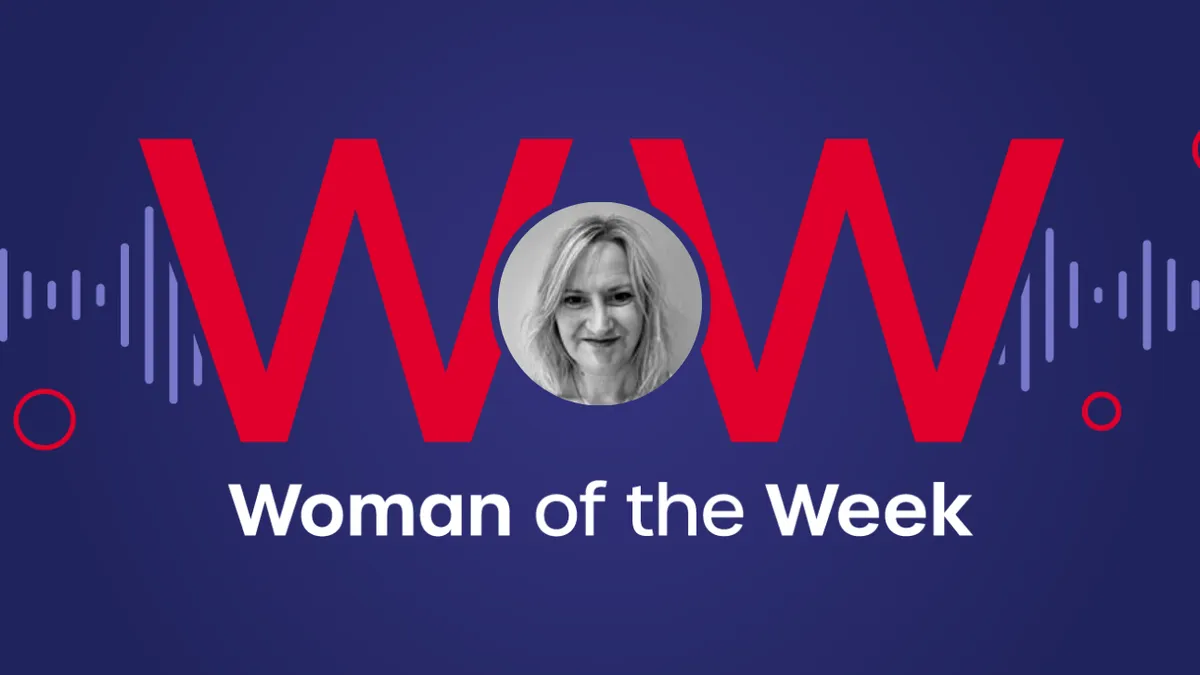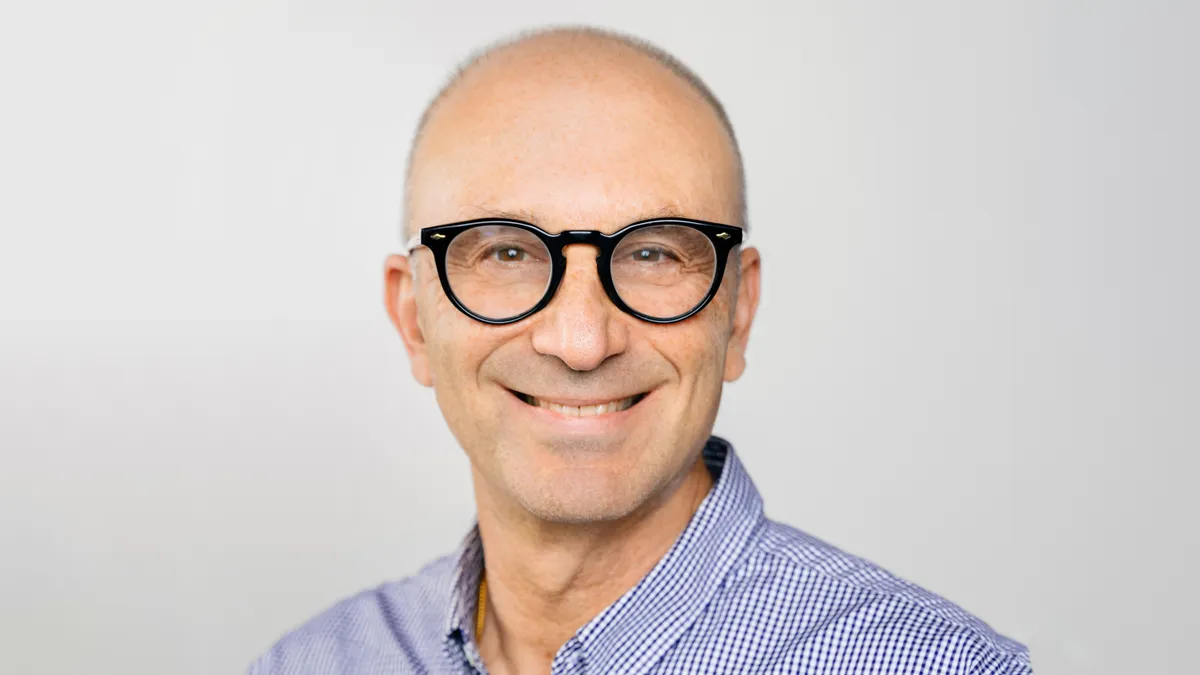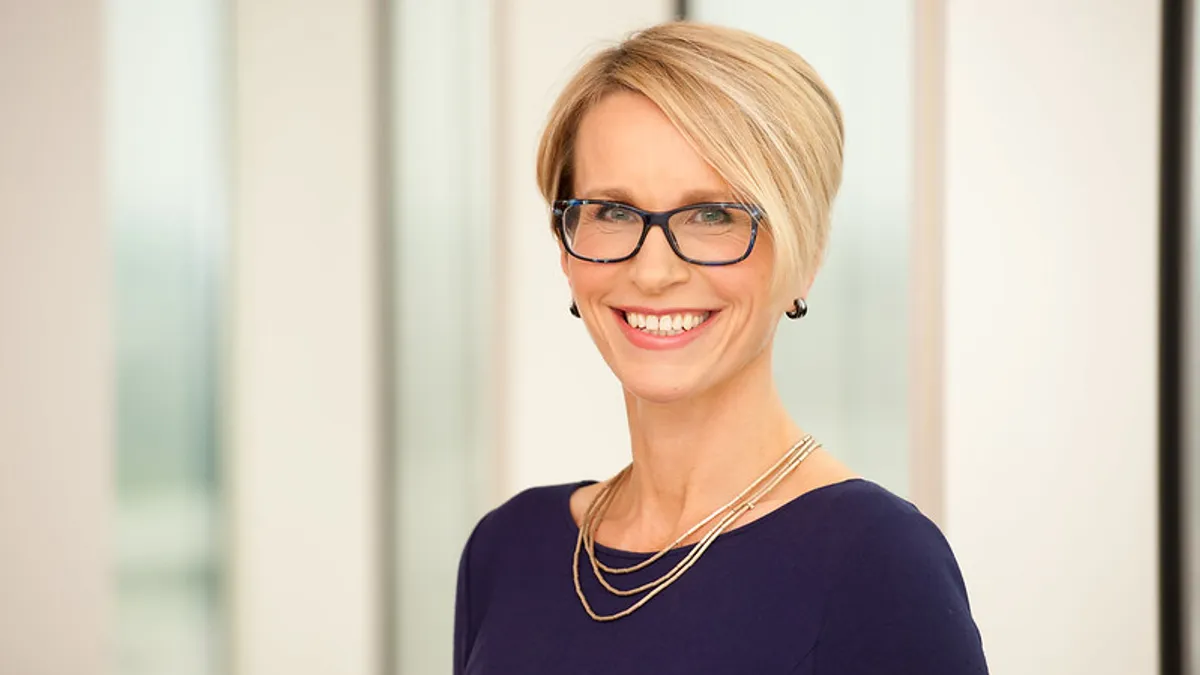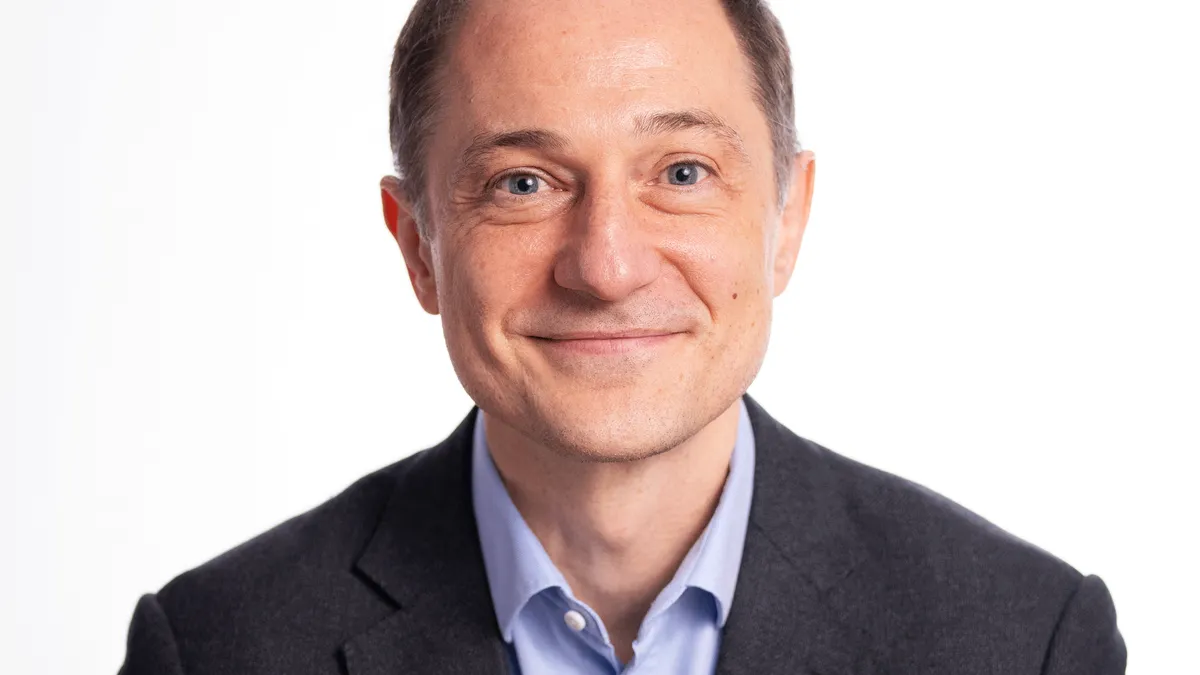Welcome to the Woman of the Week podcast, a weekly discussion that illuminates the unique stories of women leaders who are catalyzing change throughout the life sciences industry. You can check out all our podcast episodes here.
Julia Lakeland has been part of the technology revolution that has shaped and reshaped how clinical research is conducted for more than 25 years. Lakeland joined ClinPhone, a pioneer in interactive response technology, in 1999. Having studied technology and operations while in college, she thought the growing company might be a good starter job, but soon realized for her it was all “about the people.”
“(ClinPhone) was about how technology can be used to transform clinical research,” she said. “In full transparency, I joined straight out of uni and thought, ‘I’ll give it three years then will move on.’ But I genuinely love what we do. I love the industry and the difference that we bring. So, 25 years on, I’m still here and I’m still in the same industry. I’m still as passionate as I was when I was 19.”
Over the course of her career, Lakeland has seen her share of trends and new technologies. Still, one concept has reigned supreme.
“I have had the experience of working across the full spectrum of clinical systems and technology enhancements, and I’ve tried to bring it all back to a simple concept — what’s the data and who’s the user,” she said. “Just looking at the world around us and how technology is part of our world, there is a natural progression for how we conduct scientific research in the future.”
Today, as chief product officer of uMotif, an eCOA/ePRO technology-based company, Lakeland continues to push to improve the clinical trial experience for patients and other key stakeholders.
“When I look at what those future trends are likely to be, I think [about] the use of AI and machine learning … not just for conditions, but also how we target patient recruitment, where we’re looking for our patient populations and (how) we’re thinking about diverse populations,” she said. “Accepting how technology is used in the world is going to be a key driver for us and how we conduct scientific research going forward. And that’s why I find this so exciting. The digital world is accelerating at a pace faster than anything else that we’ve seen in the past.”
While Lakeland is excited by the future possibilities that evolving technologies can bring to make clinical research accessible and easier for all to participate with, she is also pragmatic in “looking at what the value of the tech is and not just for tech sake.”
“I think you have to be really careful to make sure that your tech is always fit for purpose,” she said. “Accepting that that technology is part of what we do and how we behave can be brought in to look at how we can capture data objectively in the future.”
In this WoW episode, Lakeland speaks to how technology is transforming clinical research, the inherent challenges involved with a new digital world and the deployment of clinical research on a global basis.
Welcome to WoW, the Woman of the Week podcast by PharmaVoice, powered by Industry Dive.
In this episode, Taren Grom, editor-in-chief emeritus at PharmaVoice, meets with Julia Lakeland, chief product officer, uMotif.
Taren: Julia, welcome to the WoW podcast program.
Julia: Awesome, Taren. It’s great to be here.
Taren: It’s great to meet you. Before we dig into your current role as chief product officer at uMotif, can you please share what led you to join the industry?
Julia: I joined the industry back in 1999. I’ve been described as a veteran nowadays. I left straight out of university, studied IT and operations at uni, and a small company called ClinPhone sparked my interest. They were a growing company, a tech company, but it was about the people. It was about how technology can be used to transform clinical research and I was like, I love people. I’m good on that component and I have an interest in science. So let’s see how these kind of come together.
So ultimately, it was that initial trigger and just that interest into well, what could this mean? That’s how I kind of got to where I am today. And in all full transparency, I joined and I was like straight out of uni, thought, ‘I’ll give it three years then will move on.’ But I genuinely love what we do. I love the company that I was part of. I love the industry and the difference that we bring. So 25 years on, I’m still here and I’m still in the same industry. I’m still as passionate as I was when I was 19, 20.
Taren: I love that. I love that you’re now a veteran 25 years.
Julia: Yeah.
Taren: I am obviously very familiar with ClinPhone. They were at the foreground of some pretty breaking ground technology back in the day. So you were there at that inception point and over the last 25 years, so you’ve seen some different technologies coming out of vogue, and we’ve seen a really big sea change in how clinical trials are conducted. What are some of the major trends that you have witnessed over your career that have helped to improve the clinical trial process?
Julia: That’s a great question. So, during my time, in the past, I have had the experience of working across the full spectrum of clinical systems and technology enhancements have come as part and parcel of that. But what makes the difference here is what you’re capturing the data for, for what purpose and who your user is. And I’ve tried to kind of bring it all back constantly to just that simple concept – what’s the data and who’s the user?
Because ultimately, with life science, I think that’s kind of what matters. The data has to be valid, has to be integral and the participation, whether it’s the investigator, the physicians participation from the site perspective or the patient, the participant there are so many different users here. But technology is and the world, the digital world that we are part of when I look back to like say, 1999 when we all had our Nokia phones and they were like a massive brick and then I look at when the first iPhone was introduced and quite frankly, Taren I didn’t know how to make a phone call on it. And then you look at how that world around you, that digital world that we were part of, that we use day in and day out, how all of that can be bought into enhancing how we conduct scientific research. I think that transformation is where we have most recently started to come from. And I say recent, like in the last seven years, kind of things. But I do think just looking at the world around us and how technology is part of our world, there is a natural progression for how we conduct scientific research in the future.
So, my most recent, before I moved over to uMotif I was looking at sensors and wearables within the industry and my interest there stemmed from my daughter’s diagnosis of type 1 diabetes eight years ago. So I was using this tech as a parent caring for my 3-year-old day in and day out. And I was like, this just makes such a difference. And then you start to look at the data and then if you kind of pull that forward, you can then start to think about, well, how can we use this data to predict expected outcomes potentially and therefore, then it’s almost like, how can we almost prevent conditions occurring and how can we get those early indications to really think about what we’re treating and why we’re treating them?
So I think when I look at what those future trends are likely to be, I do think the use of AI is going to come through and machine learning and then translating that more into digital biomarkers. But ultimately not just for conditions, but also about how we can think about how we target patient recruitment, and where we’re looking for our patient populations, we’re thinking about diverse populations and all of those different components I think accepting more of how technology is used in the world that’s going to be a key driver for us and how we conduct scientific research going forward. And that’s why I find this so exciting.
Taren: So you’re painting a brave new world out there. Because it’s not that long ago where paper was still king. We are talking about this digital revolution and it’s been in the ether for quite some time now, but you’re really talking about a significant shift in how clinical trials are conducted even from all the way across the spectrum. What are some of those challenges you’re dealing with on a day-to-day a basis in terms of technology adoption and technology knowledge?
Julia: So I think, like I said, we have to be accepting of the world that we’re a part of and that digital world is accelerating at a pace faster than anything else that we’ve seen in the past. I think some of those key challenges that we have, yes we can talk about the regulatory side of things and the use of the data and how we capture that data, how we validate the data. But I think possibly one of the just the most pragmatic considerations we have at the moment is the deployment of global research of looking at local infrastructure, at local healthcare systems across the world and acknowledge that different countries have different systems. They have different level of technology, different level of infrastructure and therefore, then we have to be flexible in our approach on acknowledging that some regions are further ahead than others, but again, we want to be inclusive.
So, really, I think one of the important bits that we are thinking of here, is how we can bring treatment to a global patient population but acknowledge that there are infrastructure challenges within some of those global regions that we need to work with. And I think for me that local infrastructure is one of the biggest hurdles we need to overcome.
Taren: Understood, and I totally get that different geographies, different countries are in different places in terms of the technology. But the same could be held true for when you’re training people as well. There are different states of maturity, et cetera. So I do see that working hand-in-hand. But when we talk about technology and the people piece of it, I think one of the things I hear is that people are afraid they’re going to be replaced by technology. Is that the case or is that just a myth out there?
Julia: Yeah, again, it’s a really great concept to consider and delve into a little bit more. Human nature is, at the end of the day, we’re all humans and you read what’s in the media and you think about how technology can be deployed or you hear some of the stories about how tech can be deployed. But I think being pragmatic and looking at what the value of the tech is, not just for tech sake. Also often I’ll hear conversations with people around, ‘ooh, you know what, we could do this and it would be amazing.’ It’s like, “yeah, but why do we need to do that?” The current system, the current solution works perfectly well.
So I think you have to be really careful to make sure that your tech is always fit for purpose. And just accepting of where tech is going in the future as part of our lifestyle is a key part there. We look at wearables pretty much a large percentage of us have an Apple Watch or an activity monitor and we use them as part of our lives day in and day out. So accepting that that technology is part of what we do and how we behave can really start to be bought into looking at how we can capture data objectively in the future.
Taren: Perfect. I love that fit for purpose not just technology for technology’s sake. Before we get into some of the successes of technology, let’s go back a little bit. After almost 12 years at Parexel, you joined uMotif, what entice you to join the company?
Julia: I came across uMotif back in 2018, 2019 and what I loved was that they were talking about the patient. And this was all pre-COVID, pre-DCT. Their journey was very much crystallize on the patient is what matters. And at the time, I was focused completely on objective data capture with wearables and so, Bruce and I really complemented each other. He was looking at subjective patient reported outcomes and how tech can be utilized there, but purely with the focus on the patient is what matters. The experience of the patient matters. And that was exactly the same messaging that I was having with wearables. It was around making sure that Taren, as you just said as well, they’re fit for purpose but it’s the comfort, the usability. Not just, ‘oh, here’s a device, use it.’
So it was the human nature of why we are doing what we’re doing and for what purpose. That’s really where I started to get excited. And then when this opportunity came up with uMotif, as I was like, it’s perfect, it’s the perfect job for me. It combines tech. It combines product. The company is, I agree with the values and the ethos and the outlook that the company has, the focus on the patient and all of the surrounding considerations that come with that around making, like, they make sure it’s fit for purpose but its usable and all of those bits. That’s really where I then started to think.
So moving from Parexel being a large, very large clinical research organization for such a long period of time, but then moving back into the tech space. And looking at how we can deliver and develop tech for purpose. That’s really what excited me and that’s what I love about my job today.
Taren: Fantastic. You are the chief product officer, so what does that role entail for you?
Julia: So ultimately, I set the strategic direction for the product, for the portfolio and in essence, I lead the team to make sure that we are adding value to both the user and the business. So looking at what the journey is, what the tech needs to be able to do, where it truly adds value. And then I kind of say that, in essence, I bring law and order to the chaos. Because as I alluded, tech has to be fit for purpose. It’s not just a case of, ‘well, we could do that and it would be fantastic. It’d be cool.’ I kind of like to think that I’m the rock that ground everything of, we have to have tech which is usable, which is fit for purpose, but meets the needs of our industry. So yes, that’s how I would describe my position here.
Taren: I love it. So you’re the sheriff in town.
Julia: Yeah.
Taren: Full disclosure, I know Bruce Hellman, he was one of our PharmaVOICE 100s and you were so impressed by his focus on the patient and you’ve mentioned that a couple of times. Talk to me about why that is so important to the company?
Julia: Why is the patient important to the company? Now, that is a really great question. So I think and again, it’s part of what enticed me, the patient should be important to everybody. If it wasn’t for the patient, if it wasn’t for patients, if it wasn’t for people being prepared to give their data for scientific research, we wouldn’t be moving the needle. And I think, maybe as an industry, we’re transforming the focus more from how site-based research has been conducted in the past historically, to how patient led scientific research will be conducted in the future. And I don’t mean that DCT, decentralized trials, here but I’m focusing more on who – almost like who is the most important, what is the most important criteria here? And you look at any metric as far as research is concerned, and patients ordinarily they don’t always have that much trust. They don’t necessarily trust technology. They don’t necessarily trust our industry. I think some of that really started to come through when we looked at the COVID vaccines and some of the stories that were being portrayed there.
So I think people naturally are fearful of change and they are quizzical over tech. And so for me, with uMotif focusing on the patient, acknowledging that those conceptions occur and exist and how can we overcome them, I think for me, that’s why our messaging is so important. Because it just acknowledges that there is a journey here and everybody is on a different component to it. But understanding why and appreciating that is really, I think how you can start to really entice people to be accepting and adopting new technology.
Taren: Perfect. And I do believe you’re right. I love that concept that it’s going to be a patient-led future in terms of clinical trial research. One of the things that you all are focused on eCOA and I always think that’s such a funny name. Can you share with us what that really means?
Julia: So we’re an industry that loves acronyms. So eCOA, is an E-Clinical Outcome Assessment. In essence, it’s a questionnaire, but it is ordinarily – hold on… let me think how I’m going to answer this. So eCOA is a questionnaire designed to capture specific responses to key questions. So my mom was very recently diagnosed with dementia and I found it fascinating that there were specific questions which were asked to her by the dementia nurse in a specific order. And that was a clinical outcome assessment which was conducted. But it was framed in a very specific way to ensure that there were key measurables which could be determined. And so, when you think about eCOA that’s simply an electronic version of the assessment that my mom was presented with verbally.
Taren: Got you. I’m sorry to hear about your mom’s diagnosis, I know that can be very challenging and very tough and I hope that she is being able to manage her disease there. One of the things that you all are also doing is looking at post-marketing and real-world research that are going to have really far ranging impacts on drugs and outcomes, obviously, as we move forward. Talk to me about trends you’re seeing there in terms of RWE, is they like to call it?
Julia: So one of the recent pieces of research that I did around real-world late phase was the inclusion of reading through the EMA guidelines for patient experience data. And ultimately, what this is looking for is making sure that when we come to look at medical decisions and regulatory-based decisions having that full spectrum of broader spectrum of data available rather than just looking at the traditional measures of interest, actually taking into account the broader patient experience. So it’s a bit more of a soft-focused, but acknowledging that different levels of data can be reported. So looking at general disease progression and how on a day-to-day basis what is the lifestyle associated with the patient?
Those kind of like softer data points can really start to be quite influential about understanding more post-marketing on how the drug is behaving outside of that clinical environment. So one of the bits that we’re most excited about is obviously, not just the adoption and the capture in of that patient experience data. But it’s also what can you learn from that over a certain period of time and how does that therefore then starts to complete the cycle around what further research can be used, and is there something else which can be annotated from those reported outcomes. But I think for real world, some of those key challenges that we have around adoption of technology, is that ordinarily the visits, shall we say, are much further apart so you’re looking at a more longitudinal study. And then you do want to bring in those different sources of data around how the patient is behaving and is actually living with their condition.
I think I find that really quite fascinating in that it’s outside of the traditional clinical trial, phase 1, phase 3 model into a later phase and what can we learn there? What new trends can we adopt that are occurring over that longitudinal design? And of course for that, making sure that your tech is super easy to use, bring your own device standard app, but really in that, then starting to kind of compete for somebody’s time. When you look at – if I look at my kids, for example, they’re always on TikTok or Snapchat or some social media site. But actually, in a later phase, if you’re capturing data, you’re almost vying for somebody’s time. And it’s just that engagement which is on a different level and you want to look at more subtle engagement strategies compared to the traditional phase 2, phase 3 engagement mechanisms that were ordinarily adopted.
Taren: Perfect. Thank you. Let’s switch tacks just a little bit and let’s talk about how you are leading this team in terms of your being the sheriff in town. How would you describe your leadership strengths?
Julia: Taren, I have to ask somebody. I lean on other people’s assessments actually. I think that’s probably sometimes actually your own persona is different to that of what people see. So I like to think that I am very down to earth, quite pragmatic, open, honest, and transparent. I like to validate that as well to make sure that who I think I am is actually who I am. So, when I think about some of the strengths and my style, I like to consider myself as a clear communicator. But also setting out those clear objectives and the goals and understanding and acknowledging what’s the overall outcomes… what’s the desired outcome here and then, okay let’s go on a journey together and actually, that’s how I then lead the team is that, ‘here’s our goal. This is what we need to achieve and this is why. Okay, let’s unravel that and look at the different approaches that we can take.’
And I think that’s predominately how I’ve been as successful as I am around developing those high performance teams, because I’ve led a whole host of them over the time but staying open and honest with everybody. But also, kind of acknowledging that everybody is human and not being too overly caring but acknowledging that my understanding of something could be completely different on somebody else’s. And I think again, that’s why I like to think, have that assessment that analytical assessment of – are we all on the same page. And sometimes you just got to take a step back, let everybody catch you up then you can move onto the next phase. So I hope that gives you a bit of understanding who I am and how I get things done.
Taren: Yeah. I know, that’s great. You joined the company just about the same time as the CEO, Steve Rosenberg, who I also know who took over for Bruce Hellman who is the co-founder.
Julia: Yeah.
Taren: Was there a cultural change that had needed to be managed? You were coming in to manage the products and the offerings. How did that work out for you all?
Julia: So, Steve Rosenberg joined I think nine days after me. So again, we went on this journey together. I’ve got the utmost respect for Steve, I think he’s a great leader. He’s really open, down to earth. And as a small tech company where you need that direction, because small companies the transformation that you get at uMotif, the development of the tech is like nothing I’ve seen previously. We are so fast to respond and I think that is a clear reflection over the direction and the leadership that the team brings and acknowledging that, Steve has got this wealth of experience. Bruce has got a wealth of experience around the patient and the history uMotif, so he’s really core to our foundation. Steve now has that complementary view around, ‘okay, let’s take this to the next level and how can we go there? How can we get to where we want to get to?’
So I think, for me, having both access Bruce and Steve is just, it’s so refreshing to actually be in control of your own destiny. I’ve worked in product teams previously and sometimes as a product person you want to deliver. You want to deliver value. That’s what we want to do and we want to move fast. And here, under the leadership and the guys of Steve and Bruce and Ben is the other co-founder and the leadership team, collaboratively that’s what matters. And that’s what I love about my job that we can build this tech and it adds value. It actually makes a difference. And I’m dead proud of what we’ve achieved in the last, I mean, I’ve only been here 18 months, but what we’ve achieved in such a short period of time is fantastic.
Taren: That’s great. The reason I was asking because I know part of the team is based in the States and part of the team is based in the UK and you really are a global organization, which is something you’ve had experience in doing is leading global teams. So what are some of your keys and tips for successfully managing these interactions effectively?
Julia: So, there’s different approaches you can take here, but appreciating that there are local cultural influences but we’re all human. That it’s that acknowledgement of accepting people for who they are and trying to understand what’s important to them and why. I mean, I’ve led teams obviously, I’ve worked in very large organizations with they’re predominately being US-led. I’ve also led global teams across Japan, China, India. So I’ve covered the full spectrum and you’ve got so many different cultures there. And tying it back, appreciating that your leadership style and how your communication can be interpreted, that’s the most important thing. I think it’s about managing upwards as well as downwards. So, looking at your colleagues, looking at your reports, the folks who work for you. But also looking at different leaders and different influences all around. That’s what can really start to solidify how you build a successful global team.
Taren: Perfect. As part of global teams you also have to make sure that they’re high performing. What are those qualities that you look for when you’re selecting team members?
Julia: I think a team to be successful has to have a good mix. You need a good mix of people. You want some extroverts. You want some introverts. You need some tech people. You need some people, led people. But acknowledging that a team has those different personalities that’s what I’m looking for but you have a common interest. And I think that common interest is the goal of what you want to achieve. And therefore, painting that picture – and Taren, you probably can tell I’m a bit of a storyteller – but painting that picture of this is the journey, this is the journey we’re going to go on and there’s going to be a few bumps in the road. We’re going to accept that. We are human after all. But working as a team, I can’t emphasize enough how important that has been. I’m not the type of leader who is dogmatic. I’m a very collaborative leader and I think that has been the most important foundation for me in achieving anything that I have done. You’re only as good as the people around you and a mentor said that to me a long time ago, and it has resonated with me and I’m like, ‘you know what, you’re completely that, 100 percent.’ The team around you is what makes you successful, not me.
Taren: So I was going to ask you, has there anybody who’s had a particular influence on your career as a mentor? And obviously, there has been.
Julia: There has, yeah. So everybody I’ve ever worked with or for, they all have a different, they all have some level of influence. If I was to call anybody out, I would call out Jennifer Aquino. Jen was, she literally set the expectation in may of, you can succeed, you can do this. I looked at her leadership. I was like, ‘you know what, I can do this. You’re right.’ But it’s that ability to have confidence in somebody, but still give them the handholding when it’s needed and appreciation that, if things are not…if somebody’s not very comfortable where they’re at having that open door policy. And so for me, working under her leadership, all those years ago has really resonated with me because I looked at how she was achieving. And yeah, that stuck with me and that’s really how I learned so much from those years.
Taren: It’s so funny because when you said Jennifer’s name, I was like, I know Jennifer as well.
Julia: I think most people do.
Taren: In the clinical trial space, it’s a small world.
Julia: It is such a small world, Taren. It is so so small. Yeah.
Taren: And it’s good because, while there’s a lot of…there’s certainly competition within this space, there’s also such knowledge sharing, right?
Julia: Aha.
Taren: Because everybody is focused on a similar goal and that’s to make life easier for patients who participate in clinical trial.
Julia: Make a difference.
Taren: So, while there is that competitive edge there, there’s also a great deal of generosity as well.
Julia: One hundred percent, 100 percent. And when you look at us as an industry, we’re about caring. We’re about the science. We’re about transformation of scientific research and the development of new medicines. And of course, you have to be collaborative in that instance. And it fascinates me, like I say all these years of being in this industry, the same, not many of us stray far even folks in uMotif, some of them are people that I worked with back in 1999, back in ClinPhone, none of us go far. We really don’t.
Taren: That’s so funny. That’s the beauty of it too because there’s such a great network amongst who work in this sector of the industry as well. Do you consider yourself to be a mentor?
Julia: I would like to think I am because I think that’s what makes you a great leader. And completely as I said Taren, you’re as good as the team around you. And the only way your team can get better is if you invest in them and you set them those goals and you coach them and you develop them. I’m not one of those types, I don’t shy away from difficult conversations. But when that difficult conversation is to be had, you articulate in such a way that is understanding and supportive. And so in that instance, I do consider myself a mentor. Definitely if my team around me like so we’re all on a journey, so let’s just do it together.
Taren: Great. And similarly, you are now sitting at a C-suite spot and you are a woman in technology, which is rare. Do you consider yourself to be a role model?
Julia: So I look at my little girl. My girl is 11 and she looks up to me and she said, “Mommy, what do you do for a job?” And I go, “it’s a great question, Florence. It’s a great question.” But you know what, I think everybody is a role model. Everybody has, we’ve all got this springboard available to us now where we can do anything. We can do anything. We can succeed at anything. And I’ve never not thought that for a second. So I guess in that instance, yeah, I would love to think that I’m considered a role model. I’m not quite sure my 11 year old does think I’m a role model. I don’t think I’m calling that in that instance. But definitely, I think that there’s key areas around how we can be influential and help others succeed and for me, that’s what’ important.
Taren: That’s fantastic. There is that saying, ‘have kids remain humble.’
Julia: Yeah, know your place.
Taren: Exactly. Julia, this has been a great conversation. So as we do with all of our WoW podcast, I’m going to ask you to identify one moment that changed the trajectory of your career or has left a lasting impression on you. What’s your WoW moment?
Julia: My WoW moment was eight years ago when my daughter was diagnosed with type 1 diabetes and we were rushed to hospital. No history in the family, completely out of the blue. She was 3 years old at the time. I thought she had just a urine infection and the tests came back positive for type 1. And as a parent, as an individual, your whole world completely transforms. But I was so appreciative of the industry I’m part of and the knowledge that I have of being part of what we do that I knew there were solutions out there that could make life easier for me as a caregiver. And for my daughter for growing up and looking at the science, looking at the tech, looking at how patient comfort and the reliability of the devices. I talked earlier around GCMs, all of that. That was by far my WoW moment. I looked at it and I went, ‘oh my God. Where do I start? What am I going to do?’ And then you have a word with yourself and you look around you and everything, I just found I have to embrace it.
Yeah, that was by far my WoW moment that changed my outlook and gave me a deep appreciation that actually before that, I had but I don’t think I really understood as much around the patient. And it changed my outlook, that’s for sure.
Taren: Thank you for sharing that very personal story. I have to ask, how is your daughter faring now?
Julia: She’s amazing. She’s going to be on Broadway. She wants to be a dancer, performer, a ballerina. She is incredible. She’s now got closed – we’ve continued on this tech journey. She has a closed loop circuit. Her A1c is completely under control. She an independent woman, Taren, like her mother and I wouldn’t have her any other way.
Taren: Mike drop. Perfect. Julia, that was awesome. Thank you so much for being part of our WoW podcast program. It’s been a delight.
Julia: Thank you, Taren. It’s been an absolute pleasure talking with you today. I much appreciate it. Thank you.
Thanks for listening to this episode of WoW, the Woman of the Week podcast. For more WoW episodes, visit pharmavoicecom.


 Podcast
Podcast



















